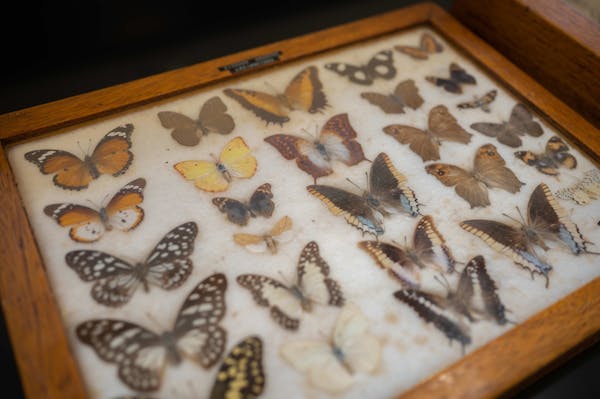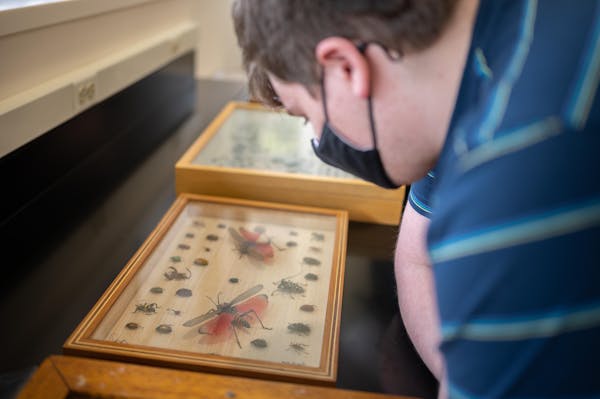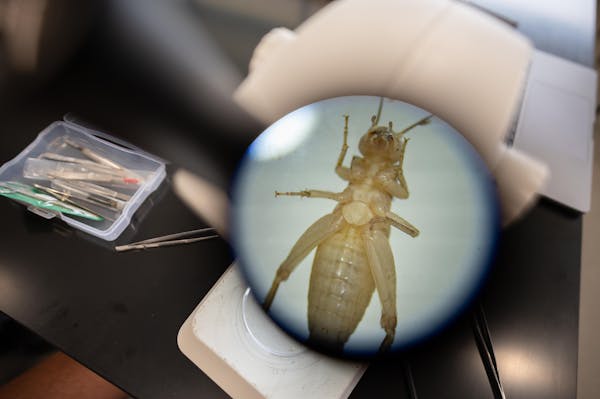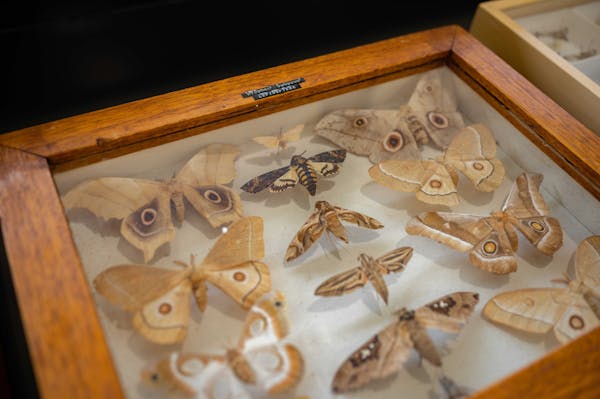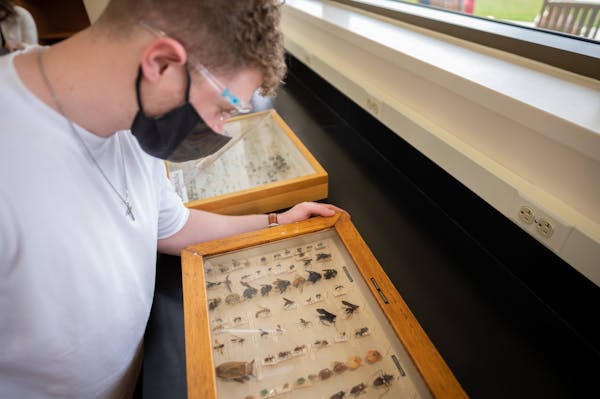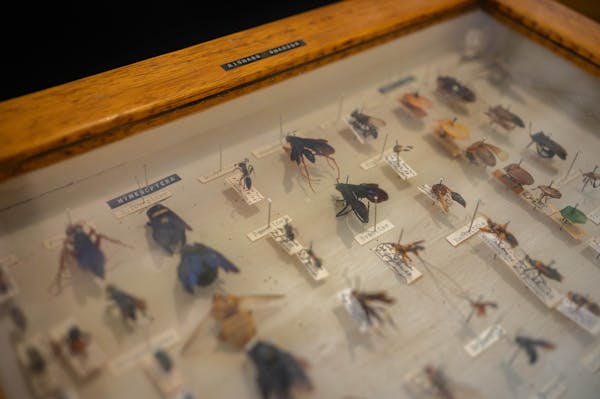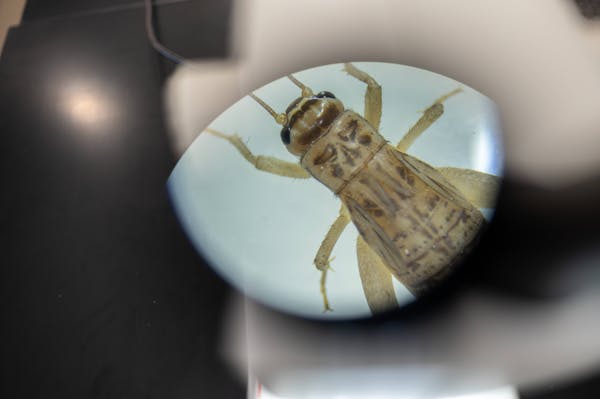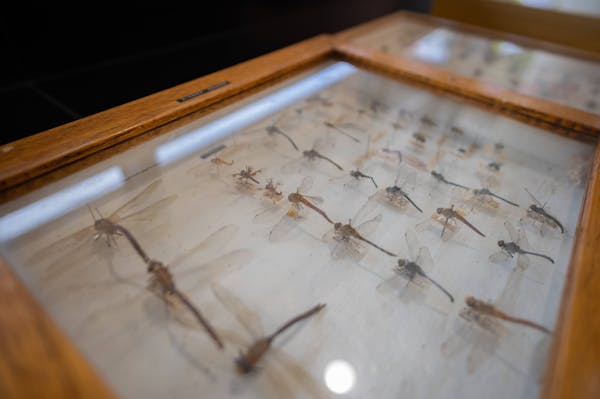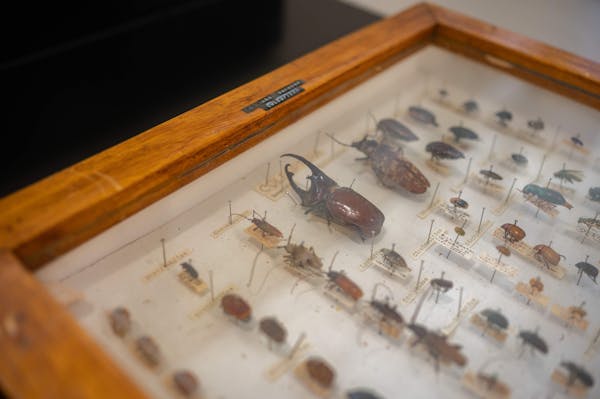A Home for Beetles, Butterflies, and Beauty in Biology
By Katie Johnson ’19, content specialist
April 22, 2021 | 9:15 a.m.

Professor of Biology Jeff Port uses the department's teaching collections in his lab.
As a missionary kid in Burkina Faso, Richard Swanson ’70 would walk around with a big stick. During solitary expeditions or adventures with his friends, he’d use the stick to lift rocks and see what kinds of insects and animals lived under them. His fascination with God’s living creatures only grew as he made memories that he still recalls fondly—like chasing a 6-foot-6-inch black forest cobra down a stream or climbing a baobab tree to take honey from a colony of African killer bees. As a teenager, Swanson began to collect some of these creatures. He taught himself how to properly preserve a variety of insects, snakes, and other reptiles, tagging them with the date, time, location, and species.
When Swanson left Burkina Faso to study both biology and anthropology at Bethel, he brought his collection of insects to campus, which he and his classmates actually used in their studies. Now—55 years later—Swanson has donated 12 cases of insects to Bethel’s biology department’s existing collection so students taking classes like invertebrate biology and ecology will be able to study them as well. Swanson’s cases constitute a teaching collection of their own, which Professor of Biology Jeff Port use to help his students learn the difference between insect species of the same order, comparing those found in Minnesota to others found all over Africa and the world. Port has already incorporated this teaching collection into his lesson plans as his class studies insects including beetles—or Coleoptera. “Some students may never have had the opportunity to observe a beetle in detail or appreciate the beauty of these animals, and these collections allow us to provide this experience,” Port says.

Biology students at Bethel now have the benefit of studying insects from around the world from the comfort of their own labs.
After Swanson graduated from Bethel, Swanson and his wife, Ursina, returned to Burkina Faso as Serving in Mission (SIM) missionaries, much like Swanson’s parents. After three years, Swanson blended his two passions—sharing the gospel and studying God’s creation—into a career that took his family all over the world, including Haiti, Niger, and Madagascar. “I did not go into Anthropology to become a professor in a university,” Swanson says. “My desire was to work in the field of applied anthropology—to use the holistic approaches of anthropology in whatever field of endeavor I worked in.” He became a monitoring and evaluation consultant, a role focused on leading multi-disciplinary teams to determine how to best preserve protected areas and how to best serve the communities of people that live near them. He has traveled to nearly every country in Africa, as well as Russia, China, Indonesia, and Jordan as a short-term consultant, and most recently, he served as associate dean and director of the International Agricultural Programs for the College of Agriculture at the University of Minnesota.
The Swansons have enjoyed their involvement in Bible Study Fellowship, participating and leading classes wherever Swanson was on assignment. Even though they’re back in Minnesota—still keeping bees and producing honey—they stay in touch with their Burkina Faso friends’ micro-drip irrigation activities and beekeeping—an interest he can trace back to collecting honey from the wild bee trees as a teenager. When Swanson and Ursina served with SIM International, he developed a bee-keeping program for the educational community to raise funds by selling honey and beeswax. Even today, he supports bee-keeping programs in Burkina Faso to raise money for rural pastors and evangelists. “Honey bees themselves—and all that is to be known about them—represent another sterling example of the complexity and beauty of God’s creation,” Swanson says.
Loading Gallery...
Richard Swanson's '70 donated insect collection
Throughout their travels, Swanson continued to collect, preserve, and transport his collection of insects and reptiles. The more he collected, the more he learned about different aspects of God’s creation and learning the whole story behind certain creatures’ habitats and ecosystems. To ensure that others will have this same learning opportunity, Swanson trusted that Bethel’s biology department would maintain and keep the insects in pristine condition. “I believe Bethel University will be a good home for them for years to come, so I am grateful that they have found a good home that will appreciate them,” Swanson says. Even as he transported the collection, he had packed the cases in boxes labeled “very fragile,” and to this day, they are stored in sealed cabinets intended to protect them from damage in Bethel’s biology department.
— Jeff Port, professor of biology
Swanson’s desire to build his collections is ultimately rooted in worship. “I am in awe of the complexity and beauty inherent in all life forms,” he says. He has loved studying different stages of these creatures’ lifestyles, their environments, and how they fit together with the rest of creation. He ties this love to experiencing Madagascar rain forests at sunset. As they listen to a metronome of their own instincts, the frogs, crickets, and other insects create an orchestra of mating calls every night. Only a couple frog species start their music, and once other creatures hear them, they offer their own sounds in nature’s harmony. “If one of these species of frogs never started up their ‘songs,’ the ones that should follow them would not open up either,” Swanson says. “Life systems are far more complex and integrated than we have any idea, and this is just another example of God’s creative wisdom and design.”
Study Biology at Bethel
Biology is about more than studying living things. It’s about discovering meaning in the fabric of life. The Department of Biological Sciences prepares graduates who make world-shaping discoveries and understand the relationship between their faith and biology. Through experiences in the lab, field, and classroom, you’ll explore the grand diversity of living things and embrace our call to care for all of creation.
